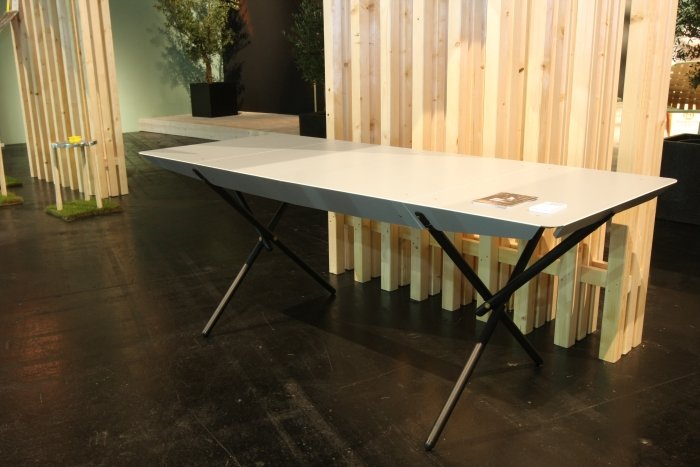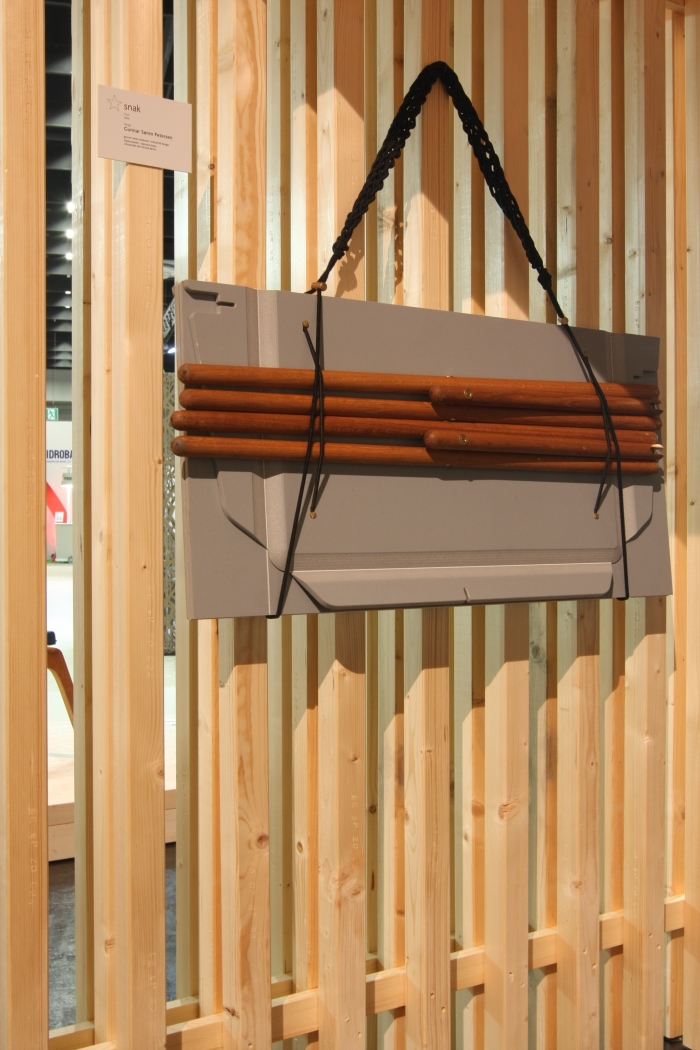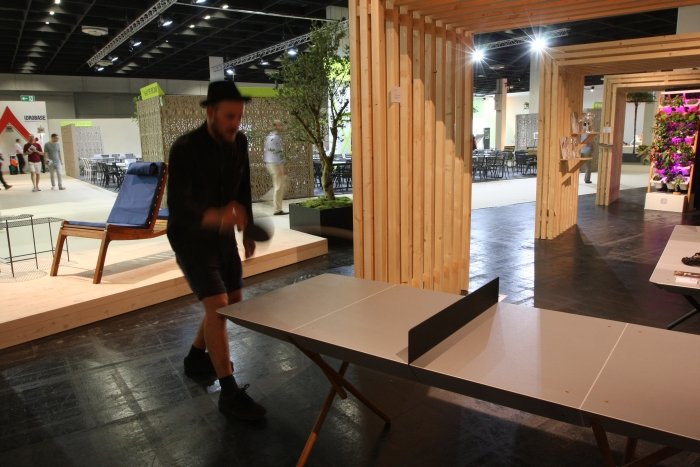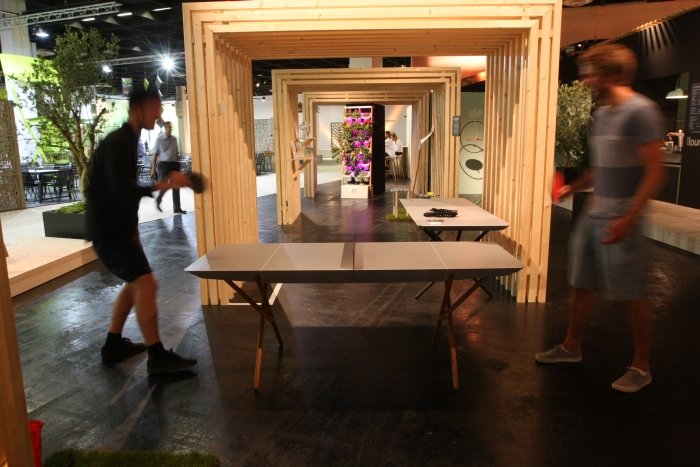It is a fact, if not a universally known fact, that the New York Museum of Modern Art's 1940 “Organic Design in Home Furnishings” competition included a category “Furniture for Outdoor Living”.
While much of what that now legendary competition instigated remains as relevant and contemporary as ever, the design of outdoor furniture has, regrettably, fallen somewhat by the wayside. A state of affairs ably demonstrated at the catchy titled "spoga+gafa garden fair 2015" in Cologne. Featuring hall upon hall of generic furniture of variable material and aesthetic quality, the current outdoor furniture market as mirrored in Cologne is the perfect representation of what happens when manufacturers produce furniture with the aim of selling customers a dream, a preformed, ideal, image of domestic success and for all a sense of belonging to a particular social group rather than concentrating on developing products created from a principle, from an attempt to solve a problem, find new solutions, or at least make the end users life a little easier and more enjoyable.
Fortunately there are a few square metres at spoga+gafa where one can find such, the Garden Unique Youngstars competition,
Inaugurated in 2013 the Garden Unique Youngstars presents designs for outdoor living which offer a glimpse of what is possible in terms of outdoor furniture beyond the tired clichés and stereotypes, designs such as the winner of the 2015 Garden Unique Youngstars competition: the garden/picnic table snak by Universität der Künste Berlin graduate Gunnar Søren Petersen.
We first came across Gunnar Søren Petersen when we saw his lamp gren light at the UdK Berlin Rundgang 2014. Whereas gren light is based on a freely configurable system, snak is very much an object for itself. If every bit as flexible, accessible and endearing.
A contemporary interpretation of the classic folding picnic table and suitable for 6 to 8 guests, snak is crafted from polypropylene, oiled oak, brass and polyester rope and is not only light and easily transportable, but can, in the wink of an eye, be converted into a table tennis table. And for all who ask why that is important, or even desirable: you are simply too old to understand and explaining won't help.
To find out a little more about snak we spoke with Gunnar Søren Petersen.
smow blog: The obvious opening question, why a picnic and camping table?
Gunnar Søren Petersen: Most camping and picnic tables are collapsible, but are in all other aspects unsatisfactory. Generally they are not that user friendly, aren't, for example, that easy to assemble and disassemble, are very rarely aesthetically pleasing and on account of their material and construction tend not to be that durable, and that all irritated me and so I decided to do something about it.
smow blog: The result is snak, in terms of stability it is quite a pared down, lightweight construction, is it also stable and, for example, how much load can it carry?
Gunnar Søren Petersen: It's a collapsible outdoor table, and so it naturally wobbles a little during use, but it is still a prototype and in terms of stability there is a bit that could be improved before it's a market ready product. However that said it currently weighs around 12 kilos and will happily support up to 90 kilos. And so I wouldn't necessarily recommend dancing on it, but, for example, a couple of crates of beer and some food isn't a problem.
smow blog: 12 kilos sounds not that much for a table of that size....
Gunnar Søren Petersen: In effect it is the material that makes it possible. The table top is CNC milled from polypropylene integral foam and that means that in comparison to a more conventional material of the same thickness snak is 30% lighter yet just as robust. In addition it will be possible to reduce weight a little more, while keeping the rigidity, through a reduction in the material thickness, albeit while remembering that a table still need it's own weight to resist natural forces like, for example, wind.
smow blog: And the decision for wooden legs is presumably an aesthetic decision, a natural contrast to the synthetic table top.....
Gunnar Søren Petersen: Exactly. With wood I felt one had not only a more accessible object but also a nice contrast between the natural and the technical. Also the use of brass as a more noble material is conceived as a detail that both compliments and contrasts with the plastic and the wood. However the plan is to offer a variety of legs, in addition to the wooden legs I currently also have anodised aluminium legs, for the real hardcore camper.
smow blog: And the table tennis element?
Gunnar Søren Petersen: That was a deliberate decision. Everyone enjoys playing table tennis when picnicking or camping, yet from my own experience, in particular at music festivals, small portable table tennis tables more often than not end up infuriating and disappointing rather than being fun. And so I thought why not integrate a table tennis feature into the table. The groove in the middle of the table could just as easily have been hidden on the underside, but I decided to place it on the top and so use it for supporting a table tennis "net".
smow blog: And presumably not just a table tennis net, we assume that other features could be slotted in...
Gunnar Søren Petersen: To be honest I hadn't thought about that, but why not. A lamp for example for long late summer evenings.....
smow blogg: We presume the plan is to find a commercial partner, we know you presented it at IMM back in January, was there any interest?
Gunnar Søren Petersen: From IMM I got some very good press coverage and received a lot of very positive feedback including several private customer enquiries, but no commercial interest. However the competition here is the perfect platform to present it to a more targeted market than was the case at IMM.
More information on snak, and Gunnar Søren Petersen, can be found at www.gunnar-petersen.com



